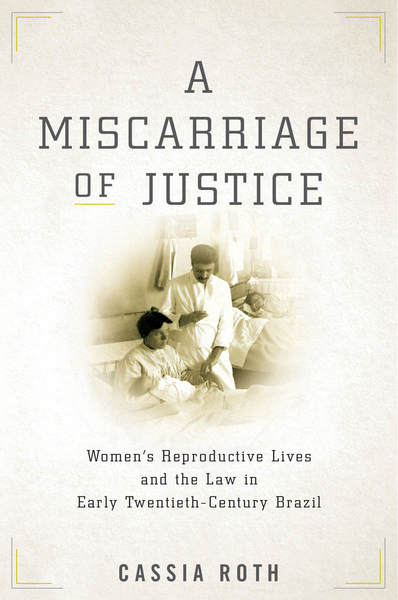Cassia Roth (University of Georgia) has published A Miscarriage of Justice: Women's Reproductive Lives and the Law in Early Twentieth-Century Brazil with Stanford University Press. From the publisher:
"Roth's remarkably wide-ranging research offers a comprehensive and nuanced analysis of the science, law, politics, and lived experiences surrounding women's reproduction in Rio de Janeiro in the first half of the twentieth century. Deeply contextualized in the social, economic, and cultural history of post-abolition Brazil, A Miscarriage of Justice interrogates the dialogue between local and global histories of medical and legal sciences while maintaining focus on individual women whose reproductive lives were increasingly pathologized and criminalized. This remarkable book is sure to become required reading in the fields of Latin American and gender history." - Sueann Caulfield
"With straightforward elegance, Roth conveys the harsh realities of women's reproductive experiences in Brazil in a time of great social transformation. Fully accounting for the historical, political, and cultural complexities of their interactions with the larger community and the state, the author documents both change over time and the continuity of women's legal—and even existential—disenfranchisement through varying political regimes." - Julia E. Rodriguez
"In A Miscarriage of Justice, Cassia Roth provides an innovative and unique history of reproduction in Brazil, weaving together medical and legal directives on childbirth, abortion, and infanticide alongside the intimate, embodied experiences of gendered 'crimes' and social inequalities in Rio de Janeiro. Taking a broad view of reproductive health that explores motherhood, infanticide, and abortion simultaneously, Roth argues that the surveillance and criminalization of women's reproductive practices and of their racialized bodies were critical anchors of Brazilian state-building, especially during the complex years of the authoritarian Estado Novo. This is a deeply researched, sophisticated, and insightful study with significant implications for understanding reproductive justice issues even in contemporary politics." - Okezi T. Otovo
Further information is available here.
--Mitra Sharafi
Praise for the book:
A Miscarriage of Justice examines women's reproductive health in relation to legal and medical policy in Rio de Janeiro, Brazil. After the abolition of slavery in 1888 and the onset of republicanism in 1889, women's reproductive capabilities—their ability to conceive and raise future citizens and laborers—became critical to the expansion of the new Brazilian state. Analyzing court cases, law, medical writings, and health data, Cassia Roth argues that the state's approach to women's health in the early twentieth century focused on criminalizing fertility control without improving services or outcomes for women. Ultimately, the increasingly interventionist state fostered a culture of condemnation around poor women's reproduction that extended beyond elite discourses into the popular imagination.By tracing how legal thought and medical knowledge became cemented into law and clinical practice, how obstetricians, public health officials, and legal practitioners approached fertility control, and how women experienced and negotiated their reproductive lives, A Miscarriage of Justice provides a new way of interpreting the intertwined histories of gender, race, reproduction, and the state—and shows how these questions continue to reverberate in debates over reproductive rights and women's health in Brazil today.
"Roth's remarkably wide-ranging research offers a comprehensive and nuanced analysis of the science, law, politics, and lived experiences surrounding women's reproduction in Rio de Janeiro in the first half of the twentieth century. Deeply contextualized in the social, economic, and cultural history of post-abolition Brazil, A Miscarriage of Justice interrogates the dialogue between local and global histories of medical and legal sciences while maintaining focus on individual women whose reproductive lives were increasingly pathologized and criminalized. This remarkable book is sure to become required reading in the fields of Latin American and gender history." - Sueann Caulfield
"With straightforward elegance, Roth conveys the harsh realities of women's reproductive experiences in Brazil in a time of great social transformation. Fully accounting for the historical, political, and cultural complexities of their interactions with the larger community and the state, the author documents both change over time and the continuity of women's legal—and even existential—disenfranchisement through varying political regimes." - Julia E. Rodriguez
"In A Miscarriage of Justice, Cassia Roth provides an innovative and unique history of reproduction in Brazil, weaving together medical and legal directives on childbirth, abortion, and infanticide alongside the intimate, embodied experiences of gendered 'crimes' and social inequalities in Rio de Janeiro. Taking a broad view of reproductive health that explores motherhood, infanticide, and abortion simultaneously, Roth argues that the surveillance and criminalization of women's reproductive practices and of their racialized bodies were critical anchors of Brazilian state-building, especially during the complex years of the authoritarian Estado Novo. This is a deeply researched, sophisticated, and insightful study with significant implications for understanding reproductive justice issues even in contemporary politics." - Okezi T. Otovo
Further information is available here.
--Mitra Sharafi
